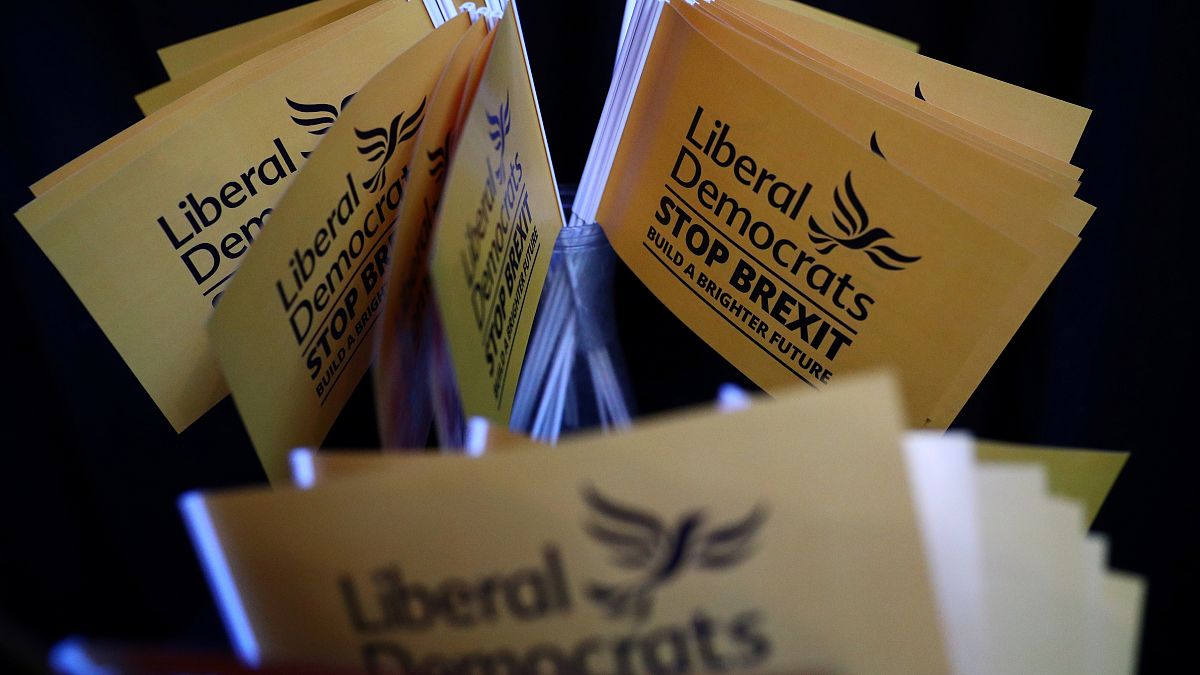Ahead of the general election on Thursday, Euronews looks at how Glasgow South is a microcosm of Liberal Democrat decline
A huge wooden dining table that dominates Carole Ford’s front room is covered with stacks of papers, hand-written notes and distinctive orange election flyers of the LIberal Democrats. All preparation for an election in Glasgow South on December 12.
An election that Ford will almost certainly lose.
Ever since 2015, when the party lost all but one of its seats in Scotland, and held just eight across the UK, the Liberal Democrats have struggled, even with a succession of leaders (Charles Kennedy and Jo Swinson among them) hailing from north of the border.
Although Glasgow South was a solid Labour seat prior to 2015, the Liberal Democrats managed second place in 2005, and third in 2010. Then in 2015 Liberal Democrat candidate Ewan Hoyle won less than 1,500 votes. In 2017’s snap election, it was just 1,000.
In many ways, the seat is a microcosm of the Liberal Democrats political journey in Scotland since its disastrous coalition deal with the Conservatives in 2010, with the then leader Nick Clegg surprising many of its supporters by choosing David Cameron over Gordon Brown.
On what Clegg branded a “cruel and punishing night” in 2015, a total of 49 Liberal Democrats were ousted, among them the great and good of the party’s past and future - Charles Kennedy, Vince Cable, Danny Alexander, Simon Hughes. It was, by all accounts, a bloodbath.
“I think people thought we shouldn’t have done that,” says Ford of the coalition deal, “we shouldn’t have gone into coalition with the Conservatives.
“Our view is we were in a real economic crisis [...], and I think in retrospect the public didn’t realise how bad the finances were. We were getting to the stage where you would go to an ATM machine and money wouldn’t have come out. We were perilously close to that.
“So I think we were right to go into that coalition, [but] I think we were wrong to agree to many of the austerity measures.”
But she thinks that unlike other parties, the Liberal Democrats have apologised for their role in austerity. “We’ve actually said: Yes, we got things wrong, we’re sorry we got things wrong, and we will be very careful in the future,” she said.
“I think we are recovering. I think we are going to do better. I think we are on the way up [but] the surge hasn’t happened as we had hoped.”
Much of that recovery is arguably due to Jo Swinson, the 39-year-old who also lost her seat in 2015 but won it back in 2017. But the early momentum of the campaign has waned, and the Liberal Democrats have slumped in the polls in recent weeks.
Ford is critical of the media for its focus on two major parties - Conservative and Labour - including the fact that Swinson was excluded from a head-to-head debate between Boris Johnson and Jeremy Corbyn last month.
She also blames the first-past-the-post voting system, which favours incumbent parties and makes it difficult for third parties to push through.
The Liberal Democrats are one of a number of UK parties - including the Greens and the Brexit Party - that favour proportional representation, under which parties are given seats in parliament directly proportional to the share of the vote that they receive.
But the Liberal Democrats have also made mistakes during this campaign, not least their stance on Brexit, and a promise to overturn the result of the second referendum and revoke Article 50.
“I think perhaps we didn’t take on board how concerned people would be about whether that was democratic. On reflection, perhaps that might not have been the way to go,” she said.
The daughter of Labour-voting parents that were both liberal and passionately pro-European, Ford spent her childhood holidays in Europe and even ate continental food at home, a rarity in the 1960s in a small Scottish village.
A former headteacher, while she had always voted Liberal Democrat, she didn’t join the party until the death of veteran leader Charles Kennedy in 2015.
“I was a huge fan. I was very upset that he died at such an early age. I thought: I’ve been meaning to do this for so long. I’m going to do it,” she said.
She began by canvassing for other Liberal Democrats in Scotland and was eventually selected as a candidate in 2019.
She accepts that it is unlikely she will win in Glasgow South, a fierce two-horse race between the SNP’s Stewart McDonald and Labour’s Johann Lamont. In 2017, Lamont beat Labour candidate Eileen Dinning by just 2,000 votes, having won it in 2015 by more than 12,000.
But she is increasingly active in the party, is its national spokesperson on children and young people, and wants to stand for the Scottish parliament if she is selected as a candidate. She believes the SNP-dominated parliament is not tackling Scotland’s issues.
“Losing something is not a comfortable thing - and I know that,” she says, “but I am willing to put my head above the parapet and so as much as a possibly can.”
